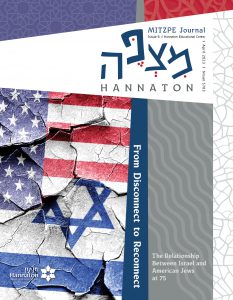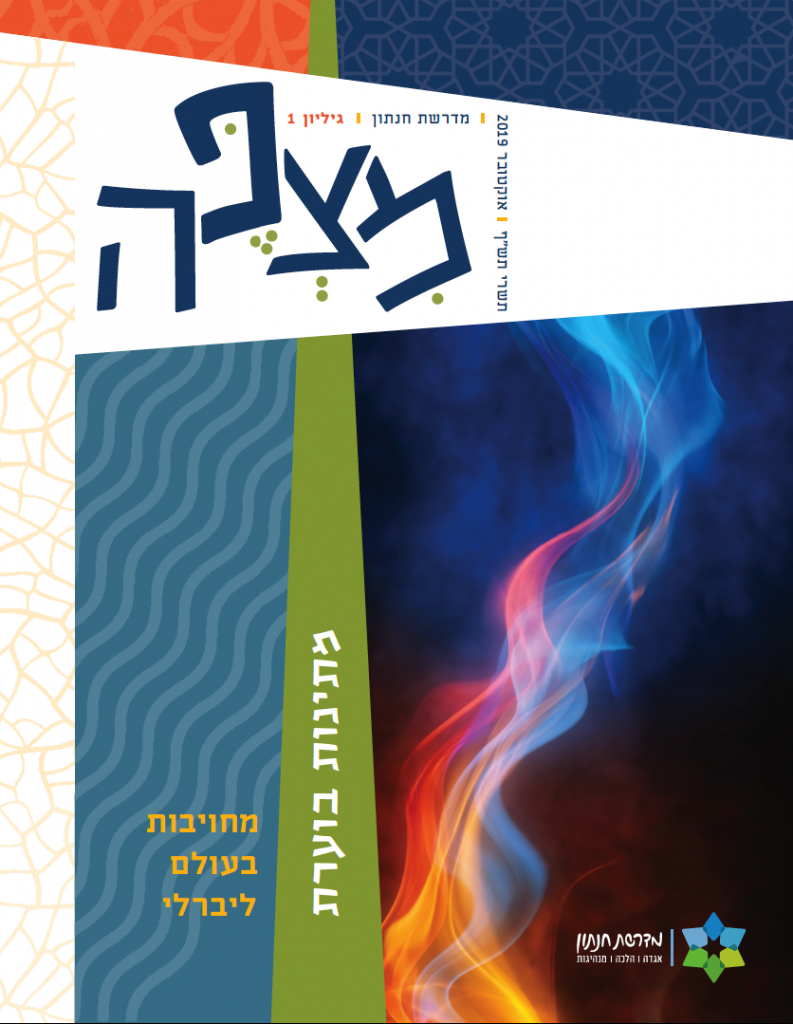You’re a new (and young) minister in the government, a resident of Hannaton, and a man of the right… Where do you come from? Tell us a little bit about yourself.
When they call me up for an aliyah to the Torah, they say my Hebrew name: Amichai ben Eitan v’Camille. Everything starts with Abba and Ima, my mother and my father. I’m the son of Eitan and Camille Chikli, who made aliyah to Israel from France. My mother was born there, in France, and my father was born in Tunisia. I grew up in a traditional household in Jerusalem.
After high school, I spent a year at the Maayan Baruch mechina (pre-army leadership academy), back in the very early years of the mechina enterprise. That was a formative year for me, and it encouraged and pushed me to forge my identity in a serious way. That year was like handing me a compass just before my ship sailed off to sea. Several key figures at the mechina had an influence on me – Erez Eshel, who would go on to establish many other such academies, and Prof. Yosef Ben Shlomo, a senior lecturer in Jewish philosophy and Holocaust studies.
In the army, I served in the Golani Brigade and in other units. I was a combat soldier and a commander, eventually attaining the rank of company commander. During my M.A. studies at Tel Aviv University, I began to found the Tavor Leadership Academy. This mechina placed an emphasis on combat service and officer positions, with a connection to Zionist identity as its keystone. I believe that the desire to take on additional functions and combat roles in the army comes from a solid Zionist identity.
The Tavor Leadership Academy gradually became an important institution, and today it holds many programs for the army and for young people in their mechina or national service year. I stood at the head of Tavor for more than ten years. From there, I went into politics.
Where does your personal connection to the Diaspora in general, and American Jewry in particular, come from?
The first meaningful connection I remember was at Camp Ramah Israel. The camp was run by NOAM (Conservative Judaism’s youth movement in Israel) and attended by American kids from USY (United Synagogue Youth, the Conservative youth movement in the United States). It was a great experience, even though my English was pretty broken, which they thought was funny.
As an adult, of course, I visited the United States every year in my capacity as the head of Tavor.
What do you think Israelis can learn from American Jewry?
We ought to be impressed by the commitment shown by many communities, such as the Jewish Federation of Detroit, which worked with Tavor for many years. I was astonished to see that the federation’s convention, attended by dozens of people, was run like the Knesset – with a president, numerous functionaries, calls to order, and so on. It was impossible to miss the federation’s commitment to the future of the Jewish people through action and philanthropy.
Another area is Jewish education in the United States. When I realized how much it costs to send a child to Jewish day school in America, my jaw dropped. This means that American Jews who aren’t well-off – really well-off – have no chance of educating their children at a Jewish school. It’s a tragedy, and the statistics are well known.
I participated in a conference of the IAC (Israeli-American Council, an umbrella organization for Israeli-American communities), and it was wonderful to see how much effort was invested in preserving Jewish “togetherness,” despite the many different political positions represented there. We can definitely learn from them.
As a cabinet minister, what’s your position on the State of Israel’s role with regard to the Diaspora?
When we say “Diaspora,” we’re usually referring to North America. That may be the largest community, but Diaspora Jewry also includes many other, smaller communities, such as throughout Europe – in Ukraine, France, and England, for example – as well as in Latin America and so forth. It’s a broad term that covers the entire spectrum of religiosity – Lithuanian Haredim, Hasidim, Modern Orthodox, the liberal streams, and more.
When it comes to the liberal streams of Judaism, the discrepancy between their strength and size in the United States and their numbers in Israel creates a really serious challenge. This is because, for the average Israeli, we might as well be talking about aliens. They’ve never met liberal Jews in their lives, they aren’t even aware of the possibility, and that makes things difficult.
If so – what’s your role with respect to pluralistic Jewry in the United States?
Politically speaking, these are challenging days when it comes to Diaspora Jewry, because the opposition is putting on a lot of pressure, generating a panic. This panic has also been exported to Diaspora Jewry – consciously and intentionally, of course – in order to put another source of pressure on the government. This crosses a red line. It’s unacceptable to put American Jewry into play in internal political disagreements. The “grandchild clause” of the Law of Return has direct bearing on Diaspora Jewry, and so it’s crucial to hear their voices on this subject at an institutional level. But for other subjects – it’s not the job of Jews across the sea to decide how judges are appointed in Israel.
Where do you see the cooperation between us, i.e. Israeli and Diaspora Jewish communities, and where are the boundaries of cooperation crossed?
We have two shared challenges that are extremely important:
- The continuity of the Jewish people. “The eternal nation” is a platitude, but it requires hard work if we want to make it come true. At the moment, not enough hard work is being done.
- The struggle against the systematic attempt to undermine the basic legitimacy of the Jewish state’s existence. These efforts are expanding, particularly in the United States, and becoming a real trend.
These two challenges are related to one another. On the one hand, there’s a weakening of domestic Jewish-Zionist identity. And on the other hand, there’s a conceptual onslaught against this very identity, on the very idea of a Jewish state, on our collective identity.
We can understand that if names such as Shiloh, Hannah, Rachel, Abraham, Isaac, Jacob, Mt. Ebal, are unfamiliar to American Jewish students, they’ll never be able to explain the Jewish people’s connection to the territories of Judea and Samaria.[1] In practice, anyone who can’t explain this will find themselves outside the story.
This also has to do with the challenge of BDS.[2] Paradoxically enough, a student on the University of Michigan campus experiences BDS more intensely than an Israeli here, even though the influence and the ramifications of the BDS movement are ultimately on us here, on the State of Israel.
For this reason, the student at UMich is a crucial link in the chain simply because he happens to be there – even though no one chose him for the task. If he’s not a Zionist, or if he opposes Israel, he’s not part of this task. But most Jewish students are pro-Israel.
We often hear from pluralistic American Jewry that on the one hand they’re connected to Israel, and on the other hand they increasingly feel that this home of theirs doesn’t want them or respect them, which weakens their Zionist identity. What do you make of that?
It says in the Mishna, in Pirkei Avot: “Any love conditional on something – when the thing ceases, the love ceases” (Pirkei Avot 5:16). For this reason, if someone’s love for Israel depends on who the government is, I have a problem with that.
If you’ll forgive the corny metaphor, my function as Minister of Diaspora Affairs is to be a bridge – to explain to the Israeli public and policymakers the voices I hear from Diaspora Jewish leadership, and at the same time to convey to Diaspora communities, as accurately as I can, the government’s positions on matters of interest to them. Take the grandchild clause, for example. Even though I don’t think it’s Diaspora Jewry’s place to decide, I’ll happily explain the debate to them. There’s room in the discussion for criticism, but not for mudslinging or hysteria. They need to be part of the discussion without intervening in the government’s decisions.
In your opinion, what’s American Jewry’s role with respect to Israel?
Their role is to maintain strong communities. I’m a fervent believer in the return of the Jewish people to Zion, but on a broader strategic level, the resilience of Jewish communities in the United States – resilience of identity, security-related resilience, financial resilience – is an asset to the State of Israel. It’s an asset in an infinite number of ways. These communities are the best ambassadors in the world, and once they care and they have a shared identity, they’ll invest in continuity both in the United States and Israel, come to visit Israel, and so on. It’s not just philanthropy – even when they just come to visit, that’s deeply important.
Will you support the Diaspora unconditionally, in any situation? And do you expect the Diaspora to unconditionally support Israel as well?
We’re family. Every Jew in Israel and across the sea is like a brother to me. That’s why someone with a solid Jewish identity would never speak in terms of civil war.[3] A sentence like that couldn’t possibly come out of the mouth of a Jew with a real connection to his Jewish identity. It goes way beyond politics.
In this sense, the role of the Minister of Diaspora Affairs – sort of like the role of Israel’s president – isn’t a political role. It’s not my job to influence the political views of Jews in France, Argentina, or Miami.
You’ve only held this position for a short time, but we’d love to hear: What are the major aims you want to advance? What’s important for you to advance on a personal level?
I’m choosy about my goals – you have to be very focused, because the only thing that’s certain in politics is uncertainty… My primary goal is to make Jewish education [in the Diaspora] more accessible so that it won’t be reserved for the rich. That’s the task – to invest in a girsa deyankuta, something we take in with our mother’s milk, that won’t be forgotten so easily. For a child who’s never been exposed to knowledge of Judaism, even Birthright trips won’t help.
The Ministry of Diaspora Affairs has the ability to create partnerships and matching. Our goal is to create an initiative similar to Mosaic United, called Alef-Bet, that will be dedicated to this goal. We’ll build partnerships with Jewish schools that teach the Hebrew language, Jewish identity in all its streams and diversity, and Jewish history, and that strengthen the connection to Zionism and to the State of Israel. These fields are an entrance requirement in order to participate in the initiative, and there’s no point in investing in a school that doesn’t work to promote them.
As a minister, what’s your commitment to pluralistic Jewry?
On controversial issues, such as the ezrat Yisrael (the mixed-gender section of the Western Wall), it’s hard to reach concrete achievements. Instead, my goal is to prevent harm. I don’t think there’ll be a change to the status quo, because the Haredim have considerable political power. My goal is not to move backward, even if we don’t move forward.
I’m talking about things like the attempt to legislate punishments for immodest dress at the Western Wall – that kind of legislation doesn’t help anyone.
When it comes to the ezrat Yisrael, we can take simple actions to support it without leading to an uproar. Putting aside questions of one stream of Judaism or another, we need to make sure that families who want to put notes in the Western Wall without splitting up can do so.
What’s gone wrong along the way? What do we need to fix, and how can we fix it?
I’ll quote the great Zionist leader Yitzchak Sadeh: The width of the base determines the height of the peak. When the base – the common denominator, the level of connection to Jewish and Zionist identity, the level of connection to our story – is weakened here in Israel, and when liberal Judaism is virtually unknown among secular Israelis, it creates a disconnect in two directions – either indifference to Judaism or antagonism to non-Orthodox Judaism.
In the United States, too, Jewish identity isn’t at the height of its power, and certainly not Zionist identity. We’re living in a time that isn’t exactly a golden age, either for Judaism or for Zionism.
We could even call it a crisis. How are we going to get ourselves out of it? Either there will be Jewish young people who care about preserving the continued existence of the Jewish people, and who will take meaningful steps in this direction over time, or there won’t be.
We’ve already mentioned BDS, which is doing damage – after all, it’s increasingly fashionable to compare Israel to an apartheid state. At an important conference that took place in the Knesset in February 2023, attended by hundreds of participants from around the world, Professor Irwin Cotler, a former Canadian Minister of Justice, pointed out the significance of this comparison: Apartheid is a war crime, and if the State of Israel is a war crime, that means it must be erased. Moreover, its actions to defend itself have no moral standing, because if it's illegitimate, you can hurt it with no compunction. This is why students, particularly Jewish students, need to understand and know how to refute those claims. It doesn’t even need to be stated that there isn’t the slightest connection between the racist South African regime and the reality here in Israel, including the reality in Judea and Samaria.
One last question – Why did you choose to live in Hannaton? Are you still happy with that decision today?
I had three motivations: It was important to me to settle in the Galilee for Zionist reasons; I don’t believe it’s possible to live a full Jewish life outside the framework of a community; and I was looking for a community that would be based in a deep connection to Jewish and Zionist identity without judging people on the length of their tzitzit.
I think Hannaton is a model with the potential to be much more widespread, because it allows for a wide range of diversity – from a traditional identity to a liberal or an Orthodox identity. It’s enough that Jewish identity be important to you. It’s a space that isn’t judgmental. That’s been my experience here, and it’s what I love about this community.
[1] The West Bank
[2] The movement to for Boycott, Divestment and Sanctions against Israel
[3] This term has been thrown around here and there in Israeli political discourse over the past months.





